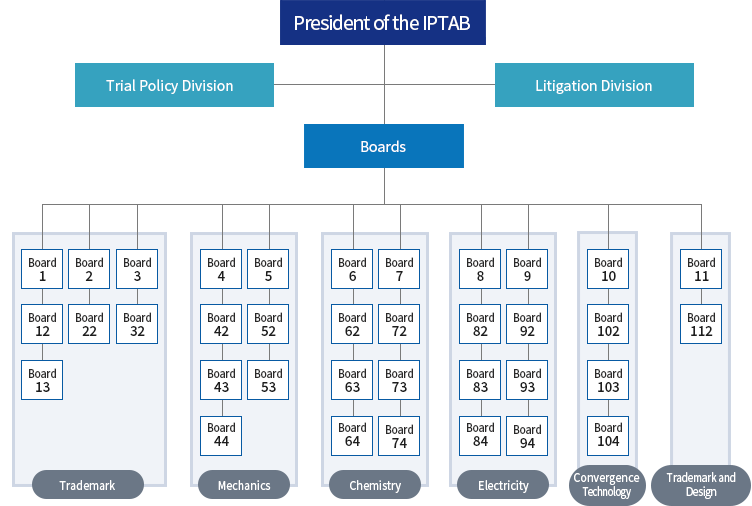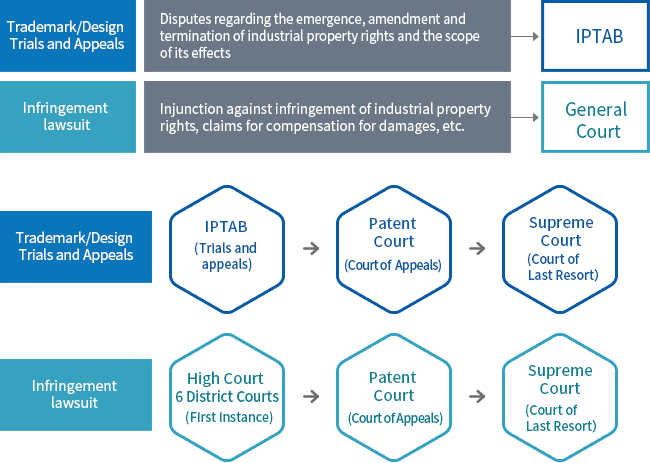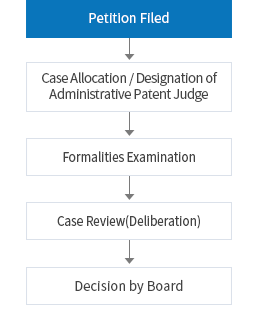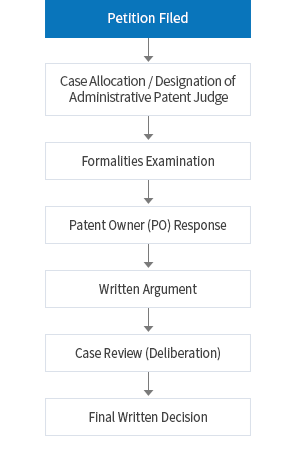The Korean Intellectual Property Trial and Appeal Board (IPTAB) conducts and hears inter partes trials and ex parte appeals that involve IP rights, including patent, utility model, design, and trademark, and renders decisions thereof. The IPTAB strives to provide transparent, coherent, reliable, yet streamlined IP dispute resolution. Further information about the IPTAB and its proceedings can be found below:
Overview of the IPTAB
Organization of the IPTAB
Trademark & Design Trial and Appeal System
Trademark/Design Administrators for Foreign-domiciled Applicants
Trial and Appeal Procedure
Overview of the IPTAB
The IPTAB is a quasi-judicial body which has been independently operated within the Ministry of Intellectual Property (MOIP) since 1 March, 1998. The Board reviews adverse decisions made by examiners called ex parte appeals and also adjudicates disputes over the validity of issued IP rights called inter partes trials.
Since its operation, the Board has strived to expand its pool of qualified administrative judges and help them to develop their capabilities and competencies. Furthermore, it also aims to provide transparent, effective and streamlined proceedings.
Organization of the IPTAB
As shown in the organizational chart below, the IPTAB consists of 36 Boards, a trial policy division and a litigation division under the leadership of the President of the IPTAB. Each Board is managed by a chief presiding administrative judge and hears and decides trial and appeal cases with different technical fields. Trial policy division is a Board operations division which supports and administers proceedings and hearings and also conducts formalities examination, trial quality evaluation, etc. Litigation Division defends The IPTAB decisions before the Court for cases in which the Minister of the MOIP is the defendant.

In the majority of cases, a case is reviewed in a composition of 3 administrative judges, consisting of the chairperson, rapporteur and an additional member. A panel of judges shall deliberate regarding the decision to be taken. An expanded panel of 5 judges, may hear and decide the case where appropriate, including cases involving issues that span a number of technical fields, cases with legal/technical difficulty and/or importance.
Trademark & Design Trial and Appeal System
Significance of a Trademark & Design Trial and Appeal System
A 'trademark & design trial and appeal' refers to a procedure in which the IPTAB makes an administrative judgment for an appeals from refusals to register trademarks and handles trial cases of various types involving applications or registrations.
Korea has three-instance system for IP-related disputes and in practice, the IPTAB serves as the first instance whose decisions can be appealed to the Patent Court and Supreme Court.
Structure of the IP Dispute Resolution

Types of Trials and Appeals
1. Ex Parte Proceedings
<Trademark>
Appeal against Examiners' Decision to Reject Trademark Application (Trademark Act Article 116)
Where a person receives a decision to reject trademark registration, decision to reject registration of additional designated goods, or decision to reject registration of the conversion of the classification of goods, he/she may request an appeal within 30 months from the date he/she is served with a certified copy of such decision to reject.
<Design>
Appeal against Examiners' Decision to Reject Applications for Design Registration or to Cancel Design Registration (Design Protection Act Article 120)
A person who is dissatisfied with any decision to reject an application for design registration or a decision to cancel the registration of a design may file a petition within 30 months from the date the person is served with a certified copy of such decision.
* Re-examination (Design Protection Act Article 64)
With respect to a design application filed on or after July 1, 2009, an applicant may make a request for re-examination or trial, selectively, following a decision of rejection.
An applicant may file a request to re-examine his/her application after amending the specification or drawings of the application within 30 months from receipt of a certified copy of the decision to reject the application; however, an applicant is not allowed to request re-examination once a petition for trial is filed.
Appeal against Examiners' Decision to Dismiss Amendment (Design Protection Act Article 119)
A person who is dissatisfied with a decision to dismiss an amendment under Article 49 (1) may file an appeal within 30 months from the date he/she is served with a certified copy of such decision.
2. Inter Partes Proceedings
<Trademark>
Trial to Invalidate Trademark Registration (Trademark Act Article 117)
There may be some trademarks which should not have been granted. In such cases, an interested party or an examiner may request a trial to invalidate such trademark registrations. Where at least two designated goods bearing the registered trademark exist, he/she may request a trial to invalidate the relevant trademark registration for each designated goods.
Grounds for invalidation are generally the same as the grounds for rejection of a trademark application.
A trial to invalidate a trademark may be requested even after the trademark rights are extinguished. Where a trial decision to invalidate a trademark registration becomes final and conclusive, trademark rights shall be deemed never to have existed; however, where a trademark registration is invalidated by any reason that arose after the granting of a trademark, the trademark right is deemed not to have existed from the time when such reason is originated.
Trial to Invalidate Registration to Renew Duration of Trademark Rights (Trademark Act Article 118)
Where registration to renew the duration of trademark rights falls
under any of the following, an interested party or an examiner may
request a trial to invalidate such renewal registration. In such
cases, where at least two designated goods bearing a registered
trademark renewed exist, he/she may request a trial to invalidate such
renewal registration for each of the designated goods:
1.
Where registration to renew the duration of trademark rights violates
Article 84(2);
* Article 84(2): An application to
register the renewal of the duration of trademark rights shall be
filed within one year prior to the expiry of the duration of trademark
rights: Provided, That any person who fails to apply for registering
the renewal of the duration of trademark rights within this period may
apply for registering the renewal of the duration of trademark rights
within six months after the duration of trademark rights expires.
2. Where a person who is not the relevant trademark right holder files
an application to register the renewal of the duration of the
trademark rights.
A trial to invalidate registration to renew the duration of trademark rights may be requested even after the trademark rights are extinguished.
Where a trial decision to invalidate registration to renew the duration of trademark rights becomes final and conclusive, such renewal registration shall be deemed never to have existed.
Trial to Revoke Registration of Exclusive License or Non-Exclusive License (Trademark Act Article 120)
Where an exclusive licensee or a non-exclusive licensee commits an act
falling under Article 119(1)2, the trademark right holder may request
a trial to revoke registration of such exclusive or nonexclusive
license.
* Article 119(1)2: Where an exclusive
licensee or a non-exclusive licensee causes the misunderstanding of
the quality of goods or confusion with goods related to another
person's business by using a registered trademark or a trademark
similar to the registered trademark on the designated goods, or goods
similar to the designated goods: Provided, That the foregoing shall
not apply where the trademark right holder pays considerable
attention.
Even if a fact that constitutes grounds for requesting a trial to revoke registration of an exclusive license or a non-exclusive license ceases to exist after the trademark right holder files such trial, the absence thereof shall not affect the grounds for cancellation.
Trial to Invalidate Registration of Conversion of Classification of Goods (Trademark Act Article 214)
Where registration of the conversion of the classification of goods
falls under any of the following, an interested party or an examiner
may request a trial to invalidate registration thereof. In such cases,
where at least two designated goods relating to registration of the
conversion of the classification of goods exist, a trial may be
requested for each of the designated goods:
1. Where
non-designated goods bearing the relevant trademark are registered for
the conversion of the classification of goods, or the scope of
designated goods has been substantially extended;
2. Where
registration of the conversion of the classification of goods is
obtained through an application filed by a person who is not the
holder of the relevant registered trademark;
3. Where
registration of the conversion of the classification of goods violates
Article 209 (3).
* Article 209(3): An application for
registration of the conversion of the classification of goods shall be
filed from one year before the duration of trademark rights expires
for a period not exceeding six months after the duration of trademark
rights expires.
Where the trial decision to the effect that registration of the conversion of the classification of goods is invalidated becomes final and conclusive, the relevant registration of the conversion of the classification of goods shall be deemed never to have existed.
Trial to Confirm the Scope of Trademark Rights (Trademark Act Article 121)
A trademark right holder, an exclusive licensee, or an interested party may request a trial to confirm the scope of trademark rights. In such cases, where at least two designated goods bearing the registered trademark exist, any of the aforesaid persons may request a trial to confirm the scope of rights for each of the designated goods.
Trial to Cancel Trademark Registration (Trademark Act Article 119)
Where a registered trademark falls under any of the followings, a trial to cancel the trademark registration may be requested:
- 1. Where a trademark right holder causes the misunderstanding of the quality of goods or confusion with goods related to another person's business among consumers by willfully using a trademark similar to the registered trademark on the designated goods, or using the registered trademark or a similar trademark on goods similar to the designated goods;
- 2. Where an exclusive licensee or a non-exclusive licensee causes the misunderstanding of the quality of goods or confusion with goods related to another person's business by using a registered trademark or a trademark similar to the registered trademark on the designated goods, or goods similar to the designated goods: Provided, That the foregoing shall not apply where the trademark right holder pays considerable attention;
- 3. Where none of a trademark right holder, an exclusive licensee or a non-exclusive licensee has used the registered trademark on the designated goods in the Republic of Korea for at least three consecutive years without justifiable grounds before a trial to cancel the registered trademark is requested;
- 4. Where the registered trademark violates the Article 93(1), (2), and (4) through (7) (transfer and joint ownership of trademark rights);
- 5. Where similar registered trademarks belong to different respective trademark right holders due to the transfer of the trademark rights, and one of them causes the misunderstanding of the quality of goods or confusion with goods related to another person's business among consumers by using his/her trademark on goods identical or similar to the designated goods bearing his/her trademark for the purpose of unfair competition;
- 6. Where a person who has the right to the registered trademark which constitutes an act of unfair competition requests a trial to revoke the trademark registration within five years from the date the relevant trademark is registered; Where the use of the registered trademark;
- 7. Where a collective mark falls under any of the following:
- (a) Where a member of the organization allows another
person to use its collective mark in violation of its articles of
incorporation, or causes the misunderstanding of the quality of
goods or the source of a geographical indication, or confusion with
goods related to another person's business among consumers by using
its collective mark in violation of its articles of incorporation:
Provided, That the foregoing shall not apply where the holder of
the collective mark right pays due attention to supervise its
members;
- (b) Where the organization is likely to cause the misunderstanding of the quality of goods or confusion with goods related to another person's business among consumers by amending its articles of incorporation under Article 36 (3) after it registers its collective mark and establishes its collective mark right;
- (c) Even where a third party causes the misunderstanding of the quality of goods or the source of a geographical indication, or confusion with goods related to another person's business among consumers by using its collective mark, the holder of the collective mark right willfully fails to take appropriate measures;
- (a) Where a member of the organization allows another
person to use its collective mark in violation of its articles of
incorporation, or causes the misunderstanding of the quality of
goods or the source of a geographical indication, or confusion with
goods related to another person's business among consumers by using
its collective mark in violation of its articles of incorporation:
Provided, That the foregoing shall not apply where the holder of
the collective mark right pays due attention to supervise its
members;
- 8. Where a collective mark with geographical indication falls
under any of the following:
- (a) In cases of an application for registration of a collective mark with geographical indication, where the articles of incorporation of the organization actually prevents its members from joining the organization, such as prohibiting them from joining the organization or stipulating impracticable conditions for joining the organization, or allow a person ineligible to use such geographical indication to join the organization;
- (b) Where the holder of a collective mark right with geographical indication or a member of the organization causes the misunderstanding of the quality of goods or confusion on the source of the geographical indication by using the collective mark in violation of Article 223;
- 9. Where a certification mark falls under any of the
following:
- (a) Where the holder of the certification mark right permits the use of the certification mark, in violation of the articles of incorporation or the rules submitted pursuant to Article 36 (4);
- (b) Where the holder of the certification mark right uses the certification mark on his/her own goods, in violation of the proviso to Article 3(3);
- (c) Where a person permitted to use the certification mark right allows another person to use such mark, in violation of the articles of incorporation or the rules, or causes confusion concerning the quality of goods, the place of origin, methods of production or other characteristics among consumers by using the certification mark in violation of the articles of incorporation or the rules: Provided, That the foregoing shall not apply where the holder of the certification mark right pays due attention to supervise any person permitted to use the certification mark;
- (d) Where the holder of the certification mark right fails to make appropriate measures even though he/she is aware that a third party who fails to obtain permission to use the certification mark causes confusion concerning the quality of goods, the place of origin, methods of production or other characteristics among consumers by using the certification mark;
- (e) Where the holder of the certification mark right actually prevents a person eligible to use the certification mark right from using the certification mark right without justifiable grounds in accordance with the articles of incorporation or the rules, or stipulates impracticable conditions for using the certification mark right in the articles of incorporation or the rules.
Any person may request a trial to cancel trademark registration: Provided, That a trial to cancel trademark registration on the grounds that the registered trademark falls under falls under paragraph (1) 4 and 6 may be requested by an interested person only.
Where a trial decision to cancel trademark registration becomes final and conclusive, such trademark rights shall be extinguished henceforth: Provided, That where the trial decision to cancel the trademark registration on the grounds that the registered trademark falls under paragraph (1) 3 becomes final and conclusive, the trademark rights shall be deemed extinguished on the date the trial is requested.
<Design>
Trial to Invalidate Design Registration (Design Protection Act Article 121)
There may be some design rights which should not have been granted. In such cases, an interested party or an examiner may file a petition for a trial to invalidate the registration of a design. For a design registration containing multiple designs, such petition shall be filed separately for each design.
Grounds for invalidation are generally the same as the grounds for rejection of a design application.
A trial for invalidation may be requested even after the relevant design right is extinguished. Where a trial decision to invalidate a design registration becomes final and conclusive, the design right shall be deemed never to have existed; however, where a design registration is invalidated by any reason that arose after the granting of a design registration, the design right is deemed not to have existed from the time when such reason is originated.
Trial to Confirm the Scope of Design Rights (Design Protection Act Article 122)
A design right-holder, an exclusive licensee, or any interested party may file a petition a trial to have the scope of the design right confirmed in order to ascertain the extent of protection of the registered design. If a case involves the registration of designs claimed in an application for registration of multiple designs, such petition shall be filed separately for each design.
Trial for Granting Non-Exclusive Licenses (Design Protection Act Article 123)
If a design right-holder, or an exclusive or non-exclusive licensee intends to obtain a license to work a third person's registered design that falls under Article 95 (1) or (2) or a design similar thereto but if the person refuses to grant a license without valid cause or if it is impracticable to obtain such license from the person, the design right-holder or the exclusive or non-exclusive licensee may file a petition for a trial, seeking the grant of a non-exclusive license to the extent necessary to work the registered design or a design similar thereto.
* Article 95: (1) If a registered design is a product made by
applying another person's registered design or a design similar
thereto, patented invention, registered utility model or registered
trademark claimed in an application filed earlier than the filing date
of the application for registration of the relevant design, or if a
design right conflicts with another person's patent right, utility
model right, or trademark right claimed in an application filed prior
to the filing date of the application for registration of the relevant
design, the design right-holder to the relevant registered design, the
exclusive or non-exclusive licensee for the relevant registered design
shall not work the registered design, commercially, without permission
from the owner of the relevant design right, patent right, utility
model right or trademark right or in breach of Article 123.
(2) If a design similar to a registered design is of a product made by
applying another person's registered design or a design similar
thereto, patented invention, registered utility model or registered
trademark claimed in an application filed earlier than the filing date
of the application for registration of the relevant design, or if a
design similar to a registered design subject to such design right
conflicts with another person's patent right, utility model right, or
trademark right under an application filed prior to the filing date of
the application for registration of the relevant design, the design
right-holder to the registered design, the exclusive or non-exclusive
licensee for the registered design shall not work the registered
design, commercially, for business without permission from the owner
of the relevant design right, patent right, utility model right or
trademark right or in breach of Article 123.
(3) If a
registered design or a design similar thereto is of a product made by
applying, or conflicting with, another person's copyright that arose
earlier than the filing date of the application for registration of
the relevant design, the design right-holder to the registered design
or a design similar thereto or the exclusive or non-exclusive licensee
for the registered design or a design similar thereto shall not work
the registered design or design similar thereto, commercially, without
permission from the copyright owner.
Trademark/Design Administrators for Foreign-domiciled Applicants (Trademark Act Article 6, Design Protection Act Article 6)
When a request for a trial is made against a foreign-domiciled applicant (a person who has neither a domicile nor a place of business in the Republic of Korea), there may be problems in receiving the copy of the written request for trial and other documents without a patent administrator, and this often causes difficulties, such as the lapse of a right. Therefore, a foreign-domiciled applicant, shall not initiate any trademark/design-related procedure or file legal proceedings, such as application, trial/appeal proceedings, etc., unless he/she is represented by a patent administrator (an agent with respect to his/her patent, who has a domicile or a place of business in the Republic of Korea).
Trial and Appeal Procedure
Ex Parte Cases

Inter Parte Case

For more information about the IPTAB and its proceedings, please refer to the following brochure. Download
- Last updated 27 April 2023
- Trial Policy Division
